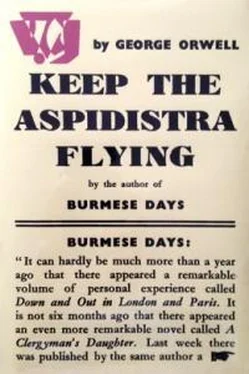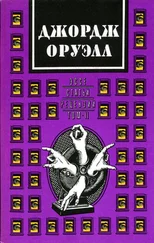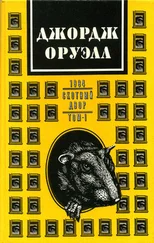The room was passably warm by now. The tea and a cigarette worked their short–lived magic. He began to feel a little less bored and angry. Should he do a spot of work after all? He ought to work, of course. He always hated himself afterwards when he had wasted a whole evening. Half unwillingly, he shoved his chair up to the table. It needed an effort even to disturb that frightful jungle of papers. He pulled a few grimy sheets towards him, spread them out, and looked at them. God, what a mess! Written on, scored out, written over, scored out again, till they were like poor old hacked cancer–patients after twenty operations. But the handwriting, where it was not crossed out, was delicate and 'scholarly'. With pain and trouble Gordon had acquired that 'scholarly' hand, so different from the beastly copper–plate they had taught him at school.
Perhaps he WOULD work; for a little while, anyway. He rummaged in the litter of papers. Where was that passage he had been working on yesterday? The poem was an immensely long one—that is, it was going to be immensely long when it was finished—two thousand lines or so, in rhyme royal, describing a day in London. London Pleasures, its name was. It was a huge, ambitious project—the kind of thing that should only be undertaken by people with endless leisure. Gordon had not grasped that fact when he began the poem; he grasped it now, however. How light–heartedly he had begun it, two years ago! When he had chucked up everything and descended into the slime of poverty, the conception of this poem had been at least a part of his motive. He had felt so certain, then, that he was equal to it. But somehow, almost from the start, London Pleasures had gone wrong. It was too big for him, that was the truth. It had never really progressed, it had simply fallen apart into a series of fragments. And out of two years' work that was all that he had to show—just fragments, incomplete in themselves and impossible to join together. On every one of those sheets of paper there was some hacked scrap of verse which had been written and rewritten and rewritten over intervals of months. There were not five hundred lines that you could say were definitely finished. And he had lost the power to add to it any longer; he could only tinker with this passage or that, groping now here, now there, in its confusion. It was no longer a thing that he created, it was merely a nightmare with which he struggled.
For the rest, in two whole years he had produced nothing except a handful of short poems—perhaps a score in all. It was so rarely that he could attain the peace of mind in which poetry, or prose for that matter, has got to be written. The times when he 'could not' work grew commoner and commoner. Of all types of human being, only the artist takes it upon him to say that he 'cannot' work. But it is quite true; there ARE times when one cannot work. Money again, always money! Lack of money means discomfort, means squalid worries, means shortage of tobacco, means ever–present consciousness of failure—above all, it means loneliness. How can you be anything but lonely on two quid a week? And in loneliness no decent book was ever written. It was quite certain that London Pleasures would never be the poem he had conceived—it was quite certain, indeed, that it would never even be finished. And in the moments when he faced facts Gordon himself was aware of this.
Yet all the same, and all the more for that very reason, he went on with it. It was something to cling to. It was a way of hitting back at his poverty and his loneliness. And after all, there were times when the mood of creation returned, or seemed to return. It returned tonight, for just a little while—just as long as it takes to smoke two cigarettes. With smoke tickling his lungs, he abstracted himself from the mean and actual world. He drove his mind into the abyss where poetry is written. The gas–jet sang soothing overhead. Words became vivid and momentous things. A couplet, written a year ago and left as unfinished, caught his eye with a note of doubt. He repeated it to himself, over and over. It was wrong, somehow. It had seemed all right, a year ago; now, on the other hand, it seemed subtly vulgar. He rummaged among the sheets of foolscap till he found one that had nothing written on the back, turned it over, wrote the couplet out anew, wrote a dozen different versions of it, repeated each of them over and over to himself. Finally there was none that satisfied him. The couplet would have to go. It was cheap and vulgar. He found the original sheet of paper and scored the couplet out with thick lines. And in doing this there was a sense of achievement, of time not wasted, as though the destruction of much labour were in some way an act of creation.
Suddenly a double knock deep below made the whole house rattle. Gordon started. His mind fled upwards from the abyss. The post! London Pleasures was forgotten.
His heart fluttered. Perhaps Rosemary HAD written. Besides, there were those two poems he had sent to the magazines. One of them, indeed, he had almost given up as lost; he had sent it to an American paper, the Californian Review, months ago. Probably they wouldn't even bother to send it back. But the other was with an English paper, the Primrose Quarterly. He had wild hopes of that one. The Primrose Quarterly was one of those poisonous literary papers in which the fashionable Nancy Boy and the professional Roman Catholic walk bras dessus, bras dessous. It was also by a long way the most influential literary paper in England. You were a made man once you had had a poem in it. In his heart Gordon knew that the Primrose Quarterly would never print his poems. He wasn't up to their standard. Still, miracles sometimes happen; or, if not miracles, accidents. After all, they'd had his poem six weeks. Would they keep it six weeks if they didn't mean to accept it? He tried to quell the insane hope. But at the worst there was a chance that Rosemary had written. It was four whole days since she had written. She wouldn't do it, perhaps, if she knew how it disappointed him. Her letters—long, ill–spelt letters, full of absurd jokes and protestations of love for him—meant far more to him than she could ever understand. They were a reminder that there was still somebody in the world who cared for him. They even made up for the times when some beast had sent back one of his poems; and, as a matter of fact, the magazines always did send back his poems, except Antichrist, whose editor, Ravelston, was his personal friend.
There was a shuffling below. It was always some minutes before Mrs Wisbeach brought the letters upstairs. She liked to paw them about, feel them to see how thick they were, read their postmarks, hold them up to the light and speculate on their contents, before yielding them to their rightful owners. She exercised a sort of droit du seigneur over letters. Coming to her house, they were, she felt, at least partially hers. If you had gone to the front door and collected your own letters she would have resented it bitterly. On the other hand, she also resented the labour of carrying them upstairs. You would hear her footsteps very slowly ascending, and then, if there was a letter for you, there would be loud aggrieved breathing on the landing—this to let you know that you had put Mrs Wisbeach out of breath by dragging her up all those stairs. Finally, with a little impatient grunt, the letters would be shoved under your door.
Mrs Wisbeach was coming up the stairs. Gordon listened. The footsteps paused on the first floor. A letter for Flaxman. They ascended, paused again on the second floor. A letter for the engineer. Gordon's heart beat painfully. A letter, please God, a letter! More footsteps. Ascending or descending? They were coming nearer, surely! Ah, no, no! The sound grew fainter. She was going down again. The footsteps died away. No letters.
Читать дальше








